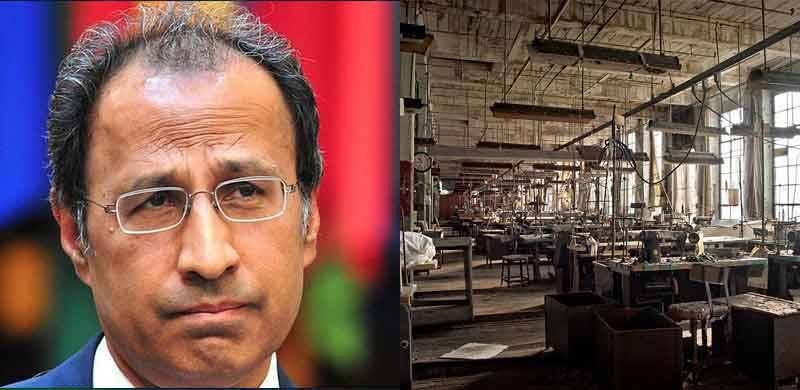
KARACHI: In his address to the Karachi Council on Foreign Relations, Advisor to the Prime Minister on Finance, Dr Abdul Hafeez Sheikh acknowledged Pakistan's failure to progress economically.
Dr Sheikh, while referring to regional economies, explained factors which would help Pakistan pursue the same level of development. Three of those major factors included investing human capital, trade alliances and moving towards the private sector rather than reliance on government support.
In an Express Tribune article titled, "Human development gets little attention in the budget", Dr Manzoor Ahmed explains how Sheikh's arguments for a prosperous economy are in no way coherent with the recently approved fiscal budget.
One of the factors mentioned by Sheikh was human development or investment in human capital. The budget, on the other hand, paints a bleak picture of the government's agenda to pursue human development. The education budget as mentioned in the article is already down from the previously meager amount of Rs 97 billion to Rs 77 billion.
Budget cuts do not end with education. In an attempt to reduce public sector expenditure, the health expense is already down from Rs 14 billion to Rs 11 billion.
The author asks some pertinent questions regarding the worsened economic situation of the country. Budget cuts may be necessary for difficult times but how come human development is sacrificed when Pakistan's GDP lingers around 2.4%, the lowest in the region.
The author further presents figures that the total outlay of the incumbent government's budget at Rs 8,238 billion is almost 39% higher than that of Shahid Khaqan Abbasi's government.
While commenting upon Sheikh's vision for trade alliances, the author notes that Pakistan is already a member of two regional alliances, South Asian Free Trade Area (SAFTA) and Economic Cooperation Organisation Trade Agreement (ECOTA).
The fact of the matter is that due to its limited market size, Pakistan cannot substantially contribute to regional trade neither it can form a major alliance.
The article mentions that Pakistan can at least aspire for Association of Southeast Asian Nations (ASEAN). However, it does mention that India already has a successful free trade agreement with ASEAN.
With such high tariffs, Pakistan rather looks like an 'inward' country. It may be difficult form alliances with such protectionist measures.
Finally, to counter Sheikh's final argument about moving towards private sector dynamics, the author notes that government subsidies have been increased from Rs 174 billion to Rs 271 billion.
As much as the government likes to point towards the private sector economy, it still feeds loss-making institutions such as Pakistan Steel Mills (PSM) and Pakistan International Airlines (PIA).
The author concluded that the incumbent government lacks the political will to undertake difficult decisions that may be necessary for development.
Dr Sheikh, while referring to regional economies, explained factors which would help Pakistan pursue the same level of development. Three of those major factors included investing human capital, trade alliances and moving towards the private sector rather than reliance on government support.
In an Express Tribune article titled, "Human development gets little attention in the budget", Dr Manzoor Ahmed explains how Sheikh's arguments for a prosperous economy are in no way coherent with the recently approved fiscal budget.
One of the factors mentioned by Sheikh was human development or investment in human capital. The budget, on the other hand, paints a bleak picture of the government's agenda to pursue human development. The education budget as mentioned in the article is already down from the previously meager amount of Rs 97 billion to Rs 77 billion.
Budget cuts do not end with education. In an attempt to reduce public sector expenditure, the health expense is already down from Rs 14 billion to Rs 11 billion.
The author asks some pertinent questions regarding the worsened economic situation of the country. Budget cuts may be necessary for difficult times but how come human development is sacrificed when Pakistan's GDP lingers around 2.4%, the lowest in the region.
The author further presents figures that the total outlay of the incumbent government's budget at Rs 8,238 billion is almost 39% higher than that of Shahid Khaqan Abbasi's government.
While commenting upon Sheikh's vision for trade alliances, the author notes that Pakistan is already a member of two regional alliances, South Asian Free Trade Area (SAFTA) and Economic Cooperation Organisation Trade Agreement (ECOTA).
The fact of the matter is that due to its limited market size, Pakistan cannot substantially contribute to regional trade neither it can form a major alliance.
The article mentions that Pakistan can at least aspire for Association of Southeast Asian Nations (ASEAN). However, it does mention that India already has a successful free trade agreement with ASEAN.
With such high tariffs, Pakistan rather looks like an 'inward' country. It may be difficult form alliances with such protectionist measures.
Finally, to counter Sheikh's final argument about moving towards private sector dynamics, the author notes that government subsidies have been increased from Rs 174 billion to Rs 271 billion.
As much as the government likes to point towards the private sector economy, it still feeds loss-making institutions such as Pakistan Steel Mills (PSM) and Pakistan International Airlines (PIA).
The author concluded that the incumbent government lacks the political will to undertake difficult decisions that may be necessary for development.
